英国历史与文化英文版
英国文化介绍(英文版ppt)
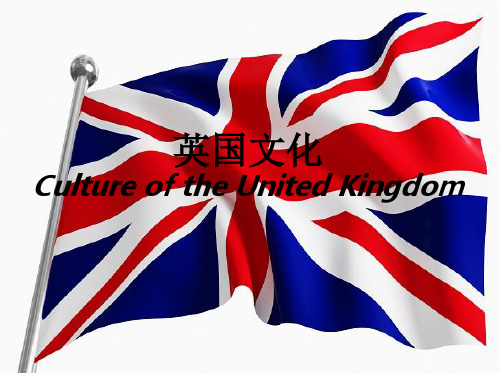
英国茶文化 Tea Culture 英国茶文化
Accounts of its origins vary. Drinking a blend of black teas for breakfast is indeed a longstanding British custom.The practice of referring to such a blend as “English breakfast tea”appears to have originated nor in England but America, as far as Colonial times.
维多利亚女王
维多利亚是第一个以“大不 列颠和爱尔兰联合王国女 王和印度女皇”名号称呼的 英国君主
英国节日——圣·帕特里克节
圣帕特里克节(St. Patrick‘s Day)是每年 的3月17日,是为了纪念爱尔兰守护神圣帕 特里克。这一节日5世纪末期起源于爱尔兰。 人们大多按照传统习俗穿着黄色和绿色的 衣服,脸上也用绿色油彩描画出三叶苜蓿 的图样。传说中,圣帕特里克当年在爱尔 兰传教时,就是利用三叶苜蓿向人们讲述 基督教义的。燃放焰火也是庆祝圣帕特里 克节不可缺少的一个组成部分。当夜幕降 临,美丽的焰火在天穹划出一道道绚烂迷 人色彩,人们欢呼雀跃,相互送去温馨的 祝福。虽说圣帕特里克节是爱尔兰的传统 节日,但数百年来,随着爱尔兰后裔遍布 欧美各国,这一节日也渐渐成为西方国家 共同的节日。
伊丽莎白塔(英语:Elizabeth Tower,旧 称大本钟,BIG BEN),即威斯敏斯特宫 钟塔,世界上著名的哥特式建筑之一,英国 国会会议厅附属的钟楼(Clock Tower) 的大报时钟的昵称。是坐落在英国伦敦泰晤 士河畔的一座钟楼,是伦敦的标志性建筑之 一。钟楼高95米,钟直径9英尺,重13.5吨。 每15分钟响一次,敲响威斯敏斯特钟声。 自从兴建地铁Jubilee线之后,大本钟受到 影响,测量显示大本钟朝西北方向倾斜约半 米。 伊丽莎白塔于1858年4月10日建成,是 英国最大的钟。塔有320英尺高(约合97.5 米),分针有14英尺长 (约合4.27米), 大本钟用人工发条,国会开会期间,钟面会 发出光芒,每隔一小时报时一次。每年的夏 季与冬天时间转换时会把钟停止,进行零件 的修补、交 换,钟的调音等。
英国历史作文英文
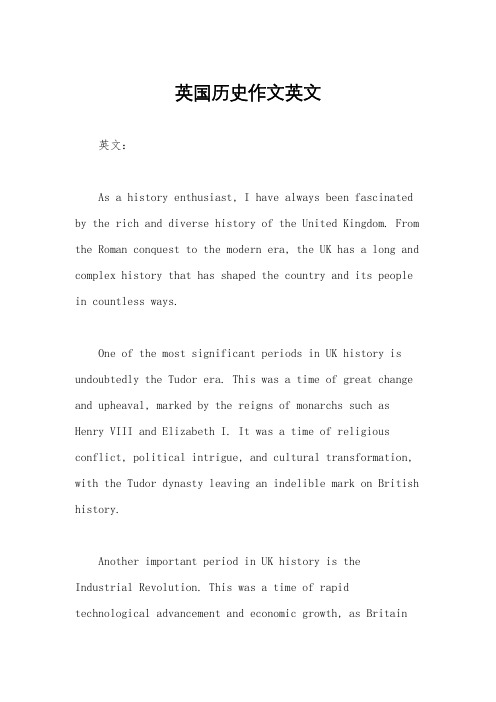
英国历史作文英文英文:As a history enthusiast, I have always been fascinated by the rich and diverse history of the United Kingdom. From the Roman conquest to the modern era, the UK has a long and complex history that has shaped the country and its people in countless ways.One of the most significant periods in UK history is undoubtedly the Tudor era. This was a time of great change and upheaval, marked by the reigns of monarchs such as Henry VIII and Elizabeth I. It was a time of religious conflict, political intrigue, and cultural transformation, with the Tudor dynasty leaving an indelible mark on British history.Another important period in UK history is theIndustrial Revolution. This was a time of rapid technological advancement and economic growth, as Britainbecame a global leader in manufacturing and industry. It was a time of great social change, as people moved from rural areas to cities and the working class emerged as a powerful force in society.中文:作为一名历史爱好者,我一直被英国丰富多彩的历史所吸引。
英国文化特点英文作文
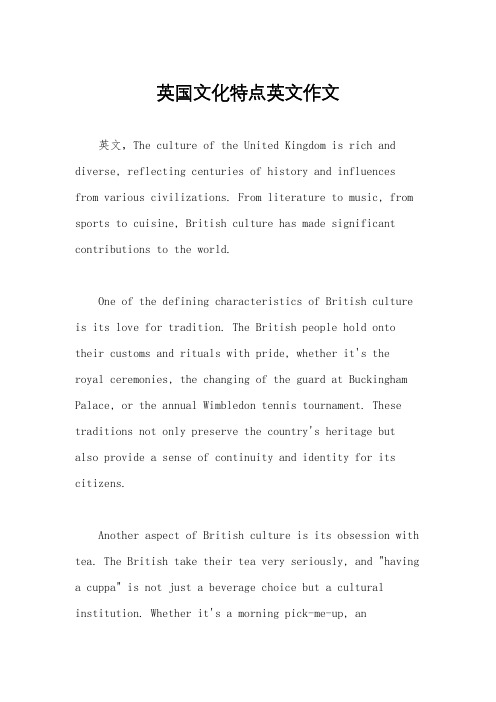
英国文化特点英文作文英文,The culture of the United Kingdom is rich and diverse, reflecting centuries of history and influences from various civilizations. From literature to music, from sports to cuisine, British culture has made significant contributions to the world.One of the defining characteristics of British culture is its love for tradition. The British people hold onto their customs and rituals with pride, whether it's theroyal ceremonies, the changing of the guard at Buckingham Palace, or the annual Wimbledon tennis tournament. These traditions not only preserve the country's heritage but also provide a sense of continuity and identity for its citizens.Another aspect of British culture is its obsession with tea. The British take their tea very seriously, and "having a cuppa" is not just a beverage choice but a cultural institution. Whether it's a morning pick-me-up, anafternoon break, or a remedy for a bad day, tea is an integral part of British life. The phrase "fancy a brew?"is often used as an invitation to share a cup of tea and engage in a friendly chat.Furthermore, British humor is renowned worldwide forits wit and irony. From Monty Python to Blackadder, British comedy has a unique style that often involves sarcasm, wordplay, and absurdity. This humor permeates everyday life, from witty banter with colleagues to the satirical cartoons in newspapers like "The Guardian" and "Private Eye."British people love to laugh at themselves and find humorin even the most mundane situations.Moreover, the UK is known for its passion for football (soccer). Football is not just a sport but a way of lifefor many Brits, with fierce rivalries between clubs and devoted fans filling stadiums every weekend. The chants,the camaraderie, and the occasional heartbreak ofsupporting a team are all part of the football culture inthe UK.Lastly, British cuisine has evolved over the centuries, influenced by both native ingredients and international flavors. While traditional dishes like fish and chips, roast beef with Yorkshire pudding, and afternoon tea with scones remain popular, the UK has also embraced culinary diversity, with Indian curry, Chinese stir-fry, and Italian pasta being widely enjoyed.In conclusion, British culture is a tapestry woven from history, tradition, humor, sports, and cuisine. It's a culture that celebrates both the past and the present, and its influence can be felt around the globe.中文,英国文化是丰富多彩的,反映了几个世纪以来的历史和来自不同文明的影响。
英国的古老历史和文化介绍英文
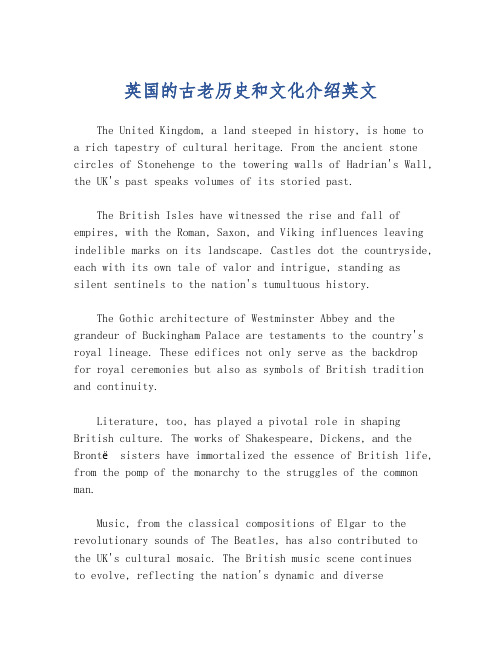
英国的古老历史和文化介绍英文The United Kingdom, a land steeped in history, is home to a rich tapestry of cultural heritage. From the ancient stone circles of Stonehenge to the towering walls of Hadrian's Wall, the UK's past speaks volumes of its storied past.The British Isles have witnessed the rise and fall of empires, with the Roman, Saxon, and Viking influences leaving indelible marks on its landscape. Castles dot the countryside, each with its own tale of valor and intrigue, standing assilent sentinels to the nation's tumultuous history.The Gothic architecture of Westminster Abbey and the grandeur of Buckingham Palace are testaments to the country's royal lineage. These edifices not only serve as the backdrop for royal ceremonies but also as symbols of British tradition and continuity.Literature, too, has played a pivotal role in shaping British culture. The works of Shakespeare, Dickens, and the Brontë sisters have immortalized the essence of British life, from the pomp of the monarchy to the struggles of the common man.Music, from the classical compositions of Elgar to the revolutionary sounds of The Beatles, has also contributed to the UK's cultural mosaic. The British music scene continuesto evolve, reflecting the nation's dynamic and diversesociety.The UK's cultural landscape is further enriched by its vibrant festivals and celebrations. From the pageantry of the Changing of the Guard to the revelry of Glastonbury, these events encapsulate the spirit of the British people and their love for tradition and innovation.In conclusion, the United Kingdom's history and culture are as complex and multifaceted as the people who call it home. Its ancient landmarks, royal traditions, literary treasures, and musical evolutions paint a picture of a nation that is both deeply rooted in its past and constantly looking towards the future.。
《英国历史英文版》课件
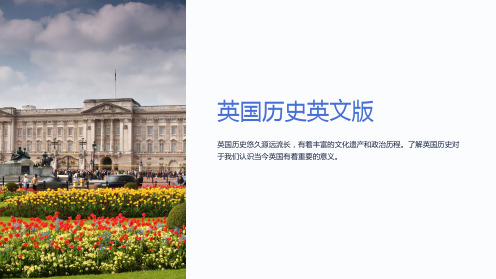
World War II saw Britain stand
economic changes in the
alone against Nazi Germany, and
subsequent years.
the country's bravery in the face of
the Blitz remains an enduring
Stuart Era
James I and the Gunpowder Plot
King James I faced numerous challenges during his reign, including the infamous Gunpowder Plot in 1605.
Charles I and the English Civil War
Innovation and technological advancements led to a seismic shift in the way goods and services were produced, transforming the British economy and society adernize the country.
The decision to leave the European
Union in 2016 has plunged Britain
into years of uncertainty and
debate, as the country grapples
Victorian Era
Queen Victoria and the British Empire
Queen Victoria's reign marked the height of British power and influence, as the country enjoyed unprecedented prosperity and global supremacy.
英国介绍英文版100词

英国介绍英文版100词全文共四篇示例,供读者参考第一篇示例:英国是一个位于欧洲的岛国,地处大西洋东部,北海以北,与爱尔兰岛相隔爱尔兰海。
英国是一个拥有悠久历史和文化的国家,曾是全球最大帝国之一。
英国共和四个国家:英格兰、苏格兰、威尔士和北爱尔兰,首都是伦敦。
英国有着优美的自然风光,如湖区、苏格兰高地等。
英国也是世界上重要的文化中心,莎士比亚、奥斯卡王尔德等文学巨匠均出自这里。
英国也是奥运会、世界杯等体育赛事的常驻地。
英国是一个生活气氛浓厚、文化多样、景色优美的国家。
第二篇示例:Introduction to the United KingdomEngland is the largest country in the UK and is home to the capital city, London. It is famous for landmarks such as Big Ben, the Tower of London, and Buckingham Palace. Scotland is known for its stunning highlands, historic castles, and the famous Loch Ness. Wales is known for its rugged coastlines, national parks, and the Welsh language. Northern Ireland is known for its picturesque countryside, Giant's Causeway, and the vibrant city of Belfast.第三篇示例:英国是一个位于欧洲的岛国,首都是伦敦。
英国是一个拥有悠久历史和文化的国家,拥有许多名胜和文化遗产。
英国有着丰富多样的自然风光,如湖区、苏格兰高地和威尔士山脉。
英国的文化英文作文
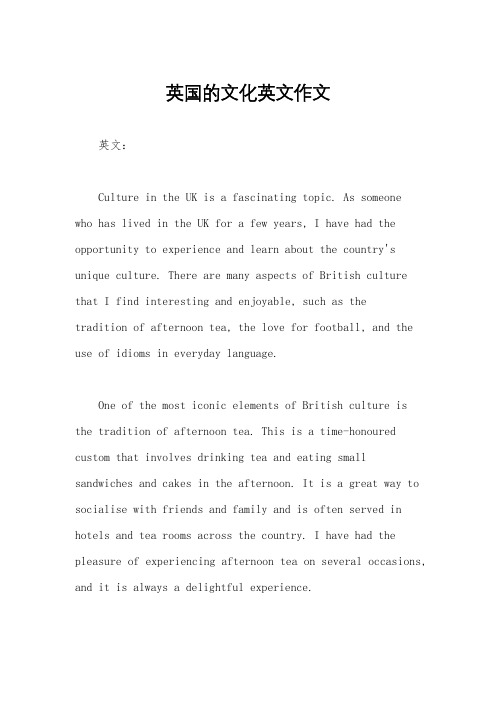
英国的文化英文作文英文:Culture in the UK is a fascinating topic. As someonewho has lived in the UK for a few years, I have had the opportunity to experience and learn about the country's unique culture. There are many aspects of British culture that I find interesting and enjoyable, such as thetradition of afternoon tea, the love for football, and the use of idioms in everyday language.One of the most iconic elements of British culture isthe tradition of afternoon tea. This is a time-honoured custom that involves drinking tea and eating small sandwiches and cakes in the afternoon. It is a great way to socialise with friends and family and is often served in hotels and tea rooms across the country. I have had the pleasure of experiencing afternoon tea on several occasions, and it is always a delightful experience.Another important part of British culture is the love for football. Football is the most popular sport in the UK, and it is deeply ingrained in the country's culture. People from all walks of life come together to support their favourite teams and players. The atmosphere in the stadiums is electric, and the passion for the sport is contagious. I have attended several football matches, and it is always an unforgettable experience.Finally, the use of idioms in everyday language is another interesting aspect of British culture. Idioms are expressions that have a different meaning from the literal words used. For example, "it's raining cats and dogs" means it's raining heavily. British people use idioms frequently in their conversations, and it can be a bit confusing for non-native speakers. However, once you get the hang of it, it can be a fun and entertaining way to communicate.中文:英国的文化是一个非常有趣的话题。
关于英国传统文化的作文用英文
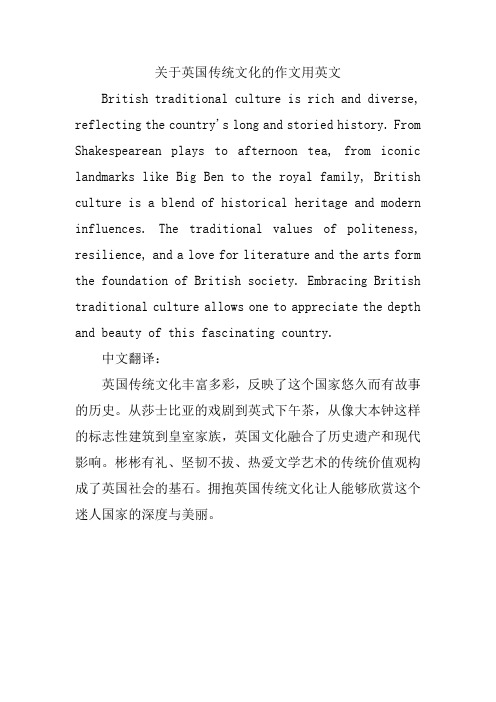
关于英国传统文化的作文用英文
British traditional culture is rich and diverse, reflecting the country's long and storied history. From Shakespearean plays to afternoon tea, from iconic landmarks like Big Ben to the royal family, British culture is a blend of historical heritage and modern influences. The traditional values of politeness, resilience, and a love for literature and the arts form the foundation of British society. Embracing British traditional culture allows one to appreciate the depth and beauty of this fascinating country.
中文翻译:
英国传统文化丰富多彩,反映了这个国家悠久而有故事的历史。
从莎士比亚的戏剧到英式下午茶,从像大本钟这样的标志性建筑到皇室家族,英国文化融合了历史遗产和现代影响。
彬彬有礼、坚韧不拔、热爱文学艺术的传统价值观构成了英国社会的基石。
拥抱英国传统文化让人能够欣赏这个迷人国家的深度与美丽。
英国历史作文英文300字
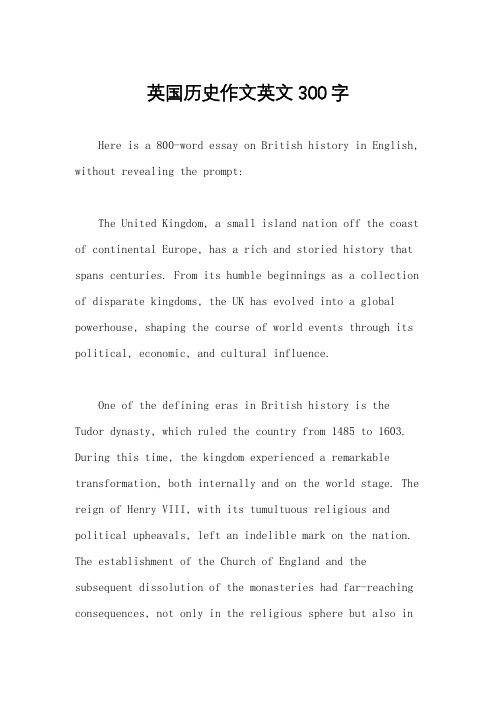
英国历史作文英文300字Here is a 800-word essay on British history in English, without revealing the prompt:The United Kingdom, a small island nation off the coast of continental Europe, has a rich and storied history that spans centuries. From its humble beginnings as a collection of disparate kingdoms, the UK has evolved into a global powerhouse, shaping the course of world events through its political, economic, and cultural influence.One of the defining eras in British history is the Tudor dynasty, which ruled the country from 1485 to 1603. During this time, the kingdom experienced a remarkable transformation, both internally and on the world stage. The reign of Henry VIII, with its tumultuous religious and political upheavals, left an indelible mark on the nation. The establishment of the Church of England and the subsequent dissolution of the monasteries had far-reaching consequences, not only in the religious sphere but also inthe social and economic realms.The Elizabethan era that followed, under the rule of Queen Elizabeth I, witnessed a flourishing of the arts, literature, and exploration. The defeat of the Spanish Armada in 1588 cemented Britain's status as a maritime power, paving the way for its eventual rise as a global empire. The works of William Shakespeare, arguably the most renowned playwright in the English language, continue to captivate audiences worldwide and serve as a testament to the cultural richness of this period.The 17th century brought with it the English Civil War, a conflict that would ultimately lead to the execution of King Charles I and the establishment of the Commonwealth of England under Oliver Cromwell. This turbulent period was followed by the Restoration of the monarchy under King Charles II, which ushered in a new era of political and social stability.The 18th and 19th centuries saw the rise of the British Empire, which at its peak spanned the globe, encompassing aquarter of the world's population and a third of its landmass. This expansionist era was marked by both remarkable achievements and controversial colonial policies, leaving a complex legacy that continues to be debated and analyzed by historians.The 20th century brought about significant challengesfor the United Kingdom, including the two World Wars, the decline of its imperial power, and the emergence of new global superpowers. Despite these trials, the UK has remained a influential player on the international stage, maintaining its position as a leading economic andpolitical force.Today, the United Kingdom stands as a vibrant, multicultural nation, grappling with the complexities of modern-day issues such as Brexit, devolution, and the ongoing process of social and cultural change. Its history, however, remains a source of national pride and a testament to the resilience and adaptability of the British people.In conclusion, the history of the United Kingdom is arich tapestry woven with threads of triumph and adversity, innovation and tradition. From the Tudor monarchs to the industrial revolution, from the heights of empire to the challenges of the modern era, the story of Britain is one that continues to captivate and inspire people around the world.。
英国介绍英文版作文

英国介绍英文版作文英文回答:Introduction to the United Kingdom。
The United Kingdom, also known as Britain, is a sovereign island nation located in northwestern Europe. It comprises England, Wales, Scotland, and Northern Ireland. The UK has a rich history, a vibrant culture, and a global influence.Geography and Climate。
The UK is bordered by the North Sea to the east, the English Channel to the south, and the Celtic Sea to the west. The country has a diverse landscape, including rolling hills, mountains, and coastline. The climate is temperate, with mild winters and warm summers.History。
The history of the UK dates back thousands of years, with evidence of human habitation from prehistoric times. The Romans invaded the region in the 1st century AD, and the country was later ruled by various groups, including the Saxons, Vikings, and Normans. The United Kingdom of Great Britain and Ireland was formed in 1801, and the Republic of Ireland seceded in 1922.Politics and Government。
英国历史作文英文
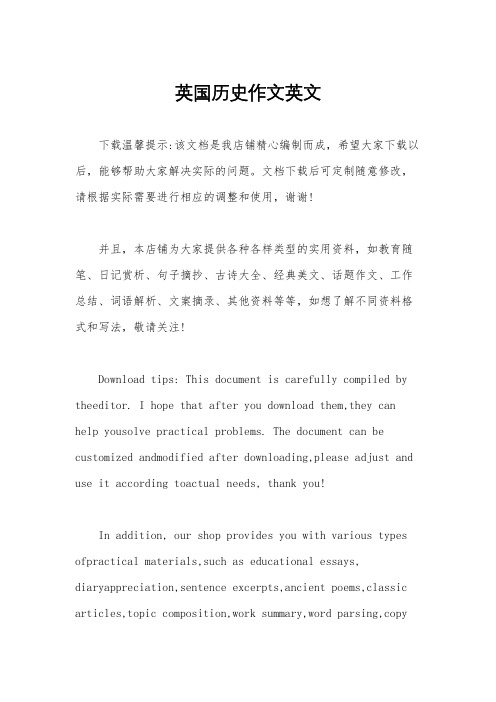
英国历史作文英文下载温馨提示:该文档是我店铺精心编制而成,希望大家下载以后,能够帮助大家解决实际的问题。
文档下载后可定制随意修改,请根据实际需要进行相应的调整和使用,谢谢!并且,本店铺为大家提供各种各样类型的实用资料,如教育随笔、日记赏析、句子摘抄、古诗大全、经典美文、话题作文、工作总结、词语解析、文案摘录、其他资料等等,如想了解不同资料格式和写法,敬请关注!Download tips: This document is carefully compiled by theeditor. I hope that after you download them,they can help yousolve practical problems. The document can be customized andmodified after downloading,please adjust and use it according toactual needs, thank you!In addition, our shop provides you with various types ofpractical materials,such as educational essays, diaryappreciation,sentence excerpts,ancient poems,classic articles,topic composition,work summary,word parsing,copyexcerpts,other materials and so on,want to know different data formats andwriting methods,please pay attention!The UK has a long history. There are so many famous historical events and figures.The British monarchy has played an important role. From the time of the kings and queens to the present.The Industrial Revolution started in the UK. It changed the world a lot.The UK has also had many wars and conflicts. Some of them had a big impact.There are many beautiful old buildings and castles in the UK. They tell the stories of the past.The culture of the UK is very rich. Literature, music, and art are all great.And don't forget about the British sense of humor. It's unique and makes people laugh.。
英国历史英文 ppt课件

Colonial Expansion 殖 民扩张
1、Began with the colonization of Newfoundland in 1583.
2、By 1900,Britain had built up a big empire, “on which the sun never set”
Roman Britain
罗马统治下的英国(公元前55年—410年)
1、In 55BC and 54BC, Julius Caesar, a Roman general, invaded Britain twice. In AD 43, the Emperor Claudius invaded Britain successfully. For nearly 400 years, Britain was under the Roman occupation, though it was never a total occupation.
3、It saw the challenge of supremacy of the Roman Catholic Church by Reformation , the rise of Humanism ,the growth of large nation-states ,the farranging voyages of exploration and a new emphasis o the importance of individual.
1、In 1833,the Grand National Consolidated Trade
abriefhistoryofBritain英国历史简述(精选五篇)

abriefhistoryofBritain英国历史简述(精选五篇)第一篇:a brief history of Britain 英国历史简述A Brief History of Britainby Pam BarrettWhen French and British construction workers met beneath the English Channel in 1990, Britain became linked to Continental Europe for the first time in 7,000 years.For it was then, when the last Ice Age ended, that melting ice flooded the low-lying lands, creating the English Channel and the North Sea and turning Britain into an island.This fact of being “set apart” was one of the two seemingly contradictory factors which would affect every aspect of the country’s subsequent history.The other was a genius for absorbing every invader and immigrant, creating a mongrel breed whose energies would establish an empire incorporating a quarter of the population of the planet.Early settlers: Stone Age people arrived, probably from the Iberian peninsula, in around 3000 BC.They lived by farming but left few traces.The most dramatic ancient monument is Stonehenge in Wiltshire, built during the next 1,000 years.How and why it was built was a mystery, but it must have had religious and political significance.The Beaker people, named after their pottery, were next to arrive.But a more importance wave of immigration, in 700 BC, was that of the Celts from eastern and central Europe.The ancestors of the Highland Scots, the Welsh and the Irish, they left behind a rich legacy of intricate and beautiful metalwork.The Romans: British recorded history began when Julius Caesar first crossed the English Channel in 55 BC.Roman rule continued for nearly 400 years, failing to subjugate only Scottish tribes, whose raiding parties were contained by Emperor Hadrian who built adefended wall right across the north of England.Eventually, threatened by barbarians at the gates of Rome, they abandoned Britain, leaving behind them a network of towns, mostly walled, a superb road system, and a new religion, Christianity.The next wave of invaders from central Europe – Angles, Saxons and Jutes – gradually pushed the native Celts west into Wales and north into Scotland.Anglo-Saxon dominance, too, lasted for four centuries, though it did not extend to Scotland, where a separate kingdom was forged by the Picts and the Scots.Although the Anglo-Saxons were a ferocious bunch, constantly squabbling, they laid the foundations of the English state, dividing the country into shires and devising an effective farming system.Their Teutonic religion, worshipping gods such as Woden and Thor, eclipsed Christianity until, at the end of the 6th century, the monk Augustine(once heard to remark “O Lord, make me chaste, but not yet”)converted the kings and the nobles.Monasteries sprang up, becoming places of learning.Treasures contained in the monasteries were a lure for the Vikings, whose ruthless raids from across the North Sea began in the 9th century.Initially they were defeated at sea by Alfred the Great, founder of the British Navy, but eventually they too were assimilated.Canute, the Danish leader, became king of Britain.The Norman Conquest: Links with Normandy, the part of France settled by the Vikings, were strong, and in 1066 William, Duke of Normandy, claimed the English throne.His triumph at the battle of Hastings decisively changed English history.As W.C.Sellar and R.J.Yeatman put it in their classic humorous history 1066 And All That: “The Norman Conquest was a Good Thing, as from this time onwards England stopped being conquered and thus was able to become top nation.”William parceled out the land to barons in return for their loyalty, and the barons parceled out land in turn to lesser nobles in return for goods and services.At the bottom were the peasants, whose feudal status resembled slavery – hence the potency of the Robin Hood legend, celebrating the Nottingham outlaw who stole from the rich to give to the poor.Although much of the Norman kings’ energies were devoted to protecting their borders, there was a great flowering of Norman culture, producing many erudite historians and scholars.In 1167 Oxford University was founded.Thanks to the influence of William Shakespeare’s history plays, much of the next period of English history is popularly remembered through his view of the shifting alliances of the Plantagenet and Tudor kings who ruled from 1154 to 1547.During this period of conflict and disease –the Black Death alone killed nearly half the population in 1348-49 –the royal succession was by no means assured.Power struggles propelled to the throne those who could command the greatest military backing from the majority of the rival barons, a process vividly illustrated by the Wars of Roses, the tussles between the House of Lancaster and York between 1455 and 1485.Frequent strife with France(including the intermittent Hundred Years’ War from 1337 to 1453)dominated international relationships.Internally, Wales was subjugated by 1288, though Scottish independence was recognized when Robert Bruce defeated English forces at the Battle of Bannockburn in 1314.Britain’s most famous king, Henry VIII, is remembered not only for his six wives(two of whom he had beheaded)but also for bringing about the Reformation, making England a Protestant rather than a Catholic countr y.His quarrel centred on the Pope’s refusal to annul his marriage to Catherine of Aragon, who couldnot oblige him with a male heir.Doctrinal differences aside, however, Henry capitalized on a growing distaste for the church’s excessive privilege and wealt h, and was thus able to get away with seizing enough monastic lands and property to finance his rule.Under Henry, Wales was formally united with England in 1536.The Age of Elizabeth: England entered its Golden Age under Elizabeth I, Henry’s daughter by Ann e Boleyn.The Elizabethan Age has a swashbuckling ring to it: the Virgin Queen and her dashing courtiers;the defeat of the Spanish Armada;Sir Walter Raleigh’s discovery of tobacco in Virginia;Sir Francis Drake’s circumnavigation of the world.Poetry, plays a nd pageantry flourished during her 45-year reign.When Elizabeth, the “Virgin Queen”, died without an heir, the throne passed to James VI of Scotland, who became James I of England, inaugurating the Stuart dynasty and effectively joining together the two kingdoms.The Stuart period was one of conflict between Crown and Parliament.James I, a staunch believer in the Divine Right of Kings, would have preferred no Parliament at all, and Charles I dissolved Parliament and initiated an 11-year period of absolute rule.The upshot was a civil war from 1622 to 1649;Charles lost and was beheaded.A period of republicanism followed, under the rule of Oliver Cromwell, but after his death the monarchy was restored and prospered under Charles II.His brother, who succeeded him as James II, was less circumspect and tried to restore absolute monarchy and the Catholic religion.The newly emerging political parties, growing in confidence, forced him to flee and invited his daughter Mary and her Dutch husband, Prince William of Orang e, to take the throne.This “Glorious Revolution”, although bloodless, was nonetheless a revolution and paved the way for Parliament’s permanent dominance overthe Crown.In 1707 an Act of Union united England and Scotland, although Scotland was allowed to retain its own Church and legislature.Many Scots felt that the union was bulldozed through by English politicians’ intent on improving their international trade prospects, and Scottish pressure to unravel the union is still a political issue.Political pragmatism triumphed again in 1714 when, a reliable Protestant monarch being needed in a hurry, a search through the family tree came up with George I of Hanover in Germany.Although he spoke no English and had little interest in his subjects, he founded a dynasty which was to span 115 years and encompass an expanding empire and an industrial revolution.The age of empire: Despite the loss of its American colonies in 1783, Britain’s trade-driven adventurism was undiminished, giving it control of West Africa and India, Newfoundland and Nova Scotia, some Caribbean island, and Australia and New Zealand.At home, farmers embraced more efficient and profitable methods, which led to the eviction of many peasant farmers who either emigrated to the New World, carrying with them a resentment that would bequeathed to future generations, or left the land to find work in the towns, which rapidly became overcrowded.This combination of landowners with surplus capital to invest and laborers in search of a living was one reason why British became the first country to industrialize.Political stability helped too, as did the security of being an island, natural resources, good trade arrangements and a native genius for inventing things.The Scottish inventor James Watt modified and improved the steam engine in the 1770s, opening the way for the efficient powering of trains, ships and factory machinery.The invention of the Spinning Jenny and the power loom created mass production in textiles.The smelting ofiron with coke, instead of charcoal, hugely increased the production of iron.A massive building program of railways, roads and canals created a new class of industrialist, whose fortunes rivaled those of the aristocracy.But it also created abominable working conditions in mines and factories, conditions which led to the slow and painful development of trade unionism.Political reforms, seized elsewhere in Europe by revolution, came gradually in Britain.Parliamentary seats were distributed more fairly among the growing new towns, but voting was still based on property ownership and universal suffrage didn’t come until 1918(and even then was scarcely universal since it excluded women under 30).The problem that dominated parliamentary debate during this period was the intractable Irish Question.The resentment over centuries of British rule in Ireland bubbled to the surface after the potato famines of the mid-1840s, when about 20 percent of Ireland’s population died of starvation and more than a million people emigrated to escape a similar fate.Demands for Irish independence grew but they were demands which many English politicians, conscious of the security problems of having an independent and possibly none-too-friendly neighbor to their west, were reluctant to grant.As with today’s IRA campai gn, the debate had a backdrop of violence.T oday, however, the Victorian Age is remembered as a time of exuberant self-confidence, symbolized by the building in London of the Crystal Palace to showcase Britain’s industrial and technical achievements in the Great Exhibition of 1851.But many of London’s inhabitants might well have wondered when they would benefit from all these accomplishments.For them, the squalor and crime which Charles Dickens portrayed so evocatively in his novels were all too real.Working-class lifeimproved considerably during the last quarter of the 19th century.Many homes had gas lighting and streets were cleaned by the new municipal councils.A new police force contained crime.The music hall provided inexpensive entertainment in towns.Bicycles became a common method of transport, and a trip by train to seaside resorts was for many a highlight of summer.In London, trains in the world’s first underground railway began puffing their way through smoke-filled tunnels between Paddington and Farrington in 1863.Art and drama flourished.By the time of Queen Victoria’s Diamond Jubilee in 1897, the country was feeling quite pleased with itself.Britannia ruled the waves, and anything seemed possible.The 20th century: But all good things come to an end.The Boer War of 1900 ended in victory for the British in South Africa but damaged its international reputation.France, Germany and America were becoming powerful competitors for world markets.The newly united German state was flexing its military muscles.The Edwardian era of the early 20th century, seemingly an idyllic time, was built on shifting sands.Dragged into World War I by a complex web of international alliances, Britain faced unimaginable carnage in which more than a million of its young men died.Social unrest at the end of the war, though less devastating than in the defeated Germany, gave more power to women(who had shouldered a heavy burden while the men were at war)and led to a General Strike by dissatisfied workers in 1926.The Irish Question was partly answered with the creation of an independent Irish free State, but six Protestant-dominated counties in the north stayed under UK rule – a time bomb which exploded in 1969.The shock waves from the 1929 New York Stock Market crash plunged Britain into depression, throwing millionsout of work, especially in the industrial areas of northern England, south Wales and Clydeside in Scotland.The monarchy was rocked by crisis in 1936 when Edward VIII, who had just become king, decided to marry the twice-divorced Mrs Wallis Simpson.His family, the church and the government opposed the match, forcing him to abdicate.His brother, a reluctant George VI, restored the monarchy’s popularity, not least through the support which he and his wife Elizabeth(later the Queen Mother)gave to their subjects during the German air raids of World War II.Although Britain’s island status saved it from invasion, this war involved civilians in an unprecedented way.Cities like Coventry were devastated by bombing and the Blitz radically changed the face of London for the first time since the Great Fire of 1666.Many children were sent to live in the countryside.Most social inequalities were set aside during the war and, when peace returned in 1945, voters turned to the Labour party in hope that it could develop an even greater egalitarianism.It laid the basis of a welfare state, providing free medical care for everyone as well as financial help for the old, the sick and the unemployed.But the war had left Britain broke.While Germany and Japan rebuilt their industries almost from scratch, helped by international aid, Britain was left to patch together a severely damaged economy.It could no longer sustain an empire, and gradually its colonies became independent.Many former subjects, especially from the Caribbean and the Indian sub-continent, settled in Britain, raising fears of racial conflict that, despite some serious tensions, were never(quite)fulfilled.As the austere 1950s gave way to the ’60s, things started to look up.New universities were built, a motorway network launched, and a reinvigorated culture promoted by a group of writersdubbed “the angry young men”.Much of the explosion of new talent came from the north of England: actors like Albert Finney, playwrights like Alan Sillitoe, and pop groups galore, led by the Beatles.The swinging Sixties, powered by a newly affluent youth, had arrived.Britain’s heavy industry might be in trouble, but in fashion and pop music it led the world.The good times died in the 1970s as inflation and unemployment soared and labour unrest led to endless strikes.Joining the European Community in 1973 seemed to produce few obvious economic benefits and revenues from North Sea oil were quickly spent rather than invested.Margaret Thatcher came to power in 1979 promising tough new policies.Her popularity quickly faded, but was revived in 1982 by the Falklands War when an invading Argentinean force was beaten off the South Atlantic islands, remnants of the old empire.Although she went on to win two further elections convincingly, by 1990 her popularity, always firmer abroad than at home, was so shaky that her party, fearing that she would not win them the next election, replaced her with a less combative leader, John Major.He duly won the 1992 election, but a reinvigorated Labour Party under T ony Blair won in 1997.The overall problems did not change, though.The economy remained weak, distrust of the European Community did not abate, nationalism simmered in Wales and Scotland, the conflict in Northern Ireland dra gged on, and the Royal Family’s private life continued to obsess the tabloid press.It was business as usual, in fact – which, in a country obsessed by continuity, was immensely reassuring.第二篇:材料学的历史简述姓名:何莞晨学号:2014012075材料学的历史简述1.按材料划分的时代生活离不开材料,人类的一切生产活动所需的工具都建立在合适的材料的基础上。
英国文化特点英文作文
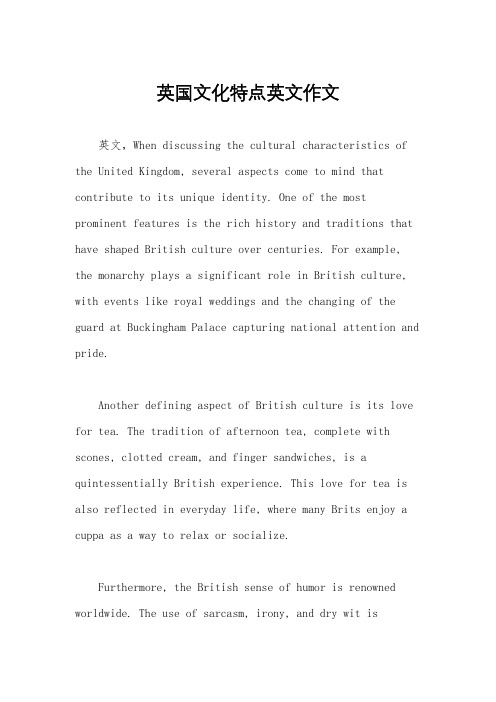
英国文化特点英文作文英文,When discussing the cultural characteristics of the United Kingdom, several aspects come to mind that contribute to its unique identity. One of the most prominent features is the rich history and traditions that have shaped British culture over centuries. For example, the monarchy plays a significant role in British culture, with events like royal weddings and the changing of the guard at Buckingham Palace capturing national attention and pride.Another defining aspect of British culture is its love for tea. The tradition of afternoon tea, complete with scones, clotted cream, and finger sandwiches, is a quintessentially British experience. This love for tea is also reflected in everyday life, where many Brits enjoy a cuppa as a way to relax or socialize.Furthermore, the British sense of humor is renowned worldwide. The use of sarcasm, irony, and dry wit isprevalent in British comedy, TV shows, and everyday conversations. This humor often relies on wordplay and clever observations, adding a layer of depth to social interactions.In terms of cultural landmarks, the UK boasts iconic sites like Big Ben, the Tower of London, and Stonehenge, each with its own historical significance and allure for tourists and locals alike. These landmarks serve as reminders of the country's rich heritage and contribute to its cultural identity.Overall, the UK's cultural landscape is a tapestry woven with history, tradition, humor, and iconic landmarks, creating a vibrant and distinct identity that continues to evolve.中文,谈到英国的文化特点,有几个方面是非常显著的,这些方面塑造了英国独特的文化身份。
描写英国作文英文

描写英国作文英文在写一篇描写英国的英文作文时,你可以从英国的历史、文化、地理、风土人情等方面展开描述。
以下是一篇参考范文:---。
England, a land steeped in history and tradition, is a captivating blend of old-world charm and modern innovation. Nestled in the heart of the United Kingdom, England boastsa rich cultural tapestry and diverse landscapes that have inspired poets, writers, and artists for centuries.One of the most iconic symbols of England is itscapital city, London. With its bustling streets, historic landmarks, and vibrant multicultural atmosphere, London stands as a beacon of culture and commerce. From the majestic towers of Westminster Abbey to the cutting-edge architecture of the Shard, London offers a glimpse into England's past and future.Beyond the bustling metropolis of London liepicturesque countryside vistas that define thequintessential English experience. Rolling hills, verdant meadows, and charming villages dotted with thatchedcottages characterize the English countryside. Visitors can explore the idyllic landscapes of the Lake District, wander the ancient stone circles of Avebury, or stroll along the rugged coastline of Cornwall.England's cultural heritage is as diverse as its landscapes. The country is home to world-renownedinstitutions such as the British Museum, the National Gallery, and the Royal Shakespeare Company. Art, literature, and music thrive in England, with a rich tradition of creativity that spans from the works of William Shakespeare to the melodies of The Beatles.The English people themselves are known for their resilience, wit, and hospitality. Whether enjoying a pintin a cozy pub, cheering on their favorite football team, or partaking in the tradition of afternoon tea, the English cherish their customs and rituals.Of course, no discussion of England would be complete without mention of its royal family. With a history that spans over a thousand years, the monarchy continues to captivate the imagination of people around the world. From the grandeur of Buckingham Palace to the pomp and ceremony of royal weddings, the monarchy remains an integral part of England's identity.In recent years, England has also emerged as a global leader in technology, finance, and innovation. Cities like Manchester, Bristol, and Cambridge are hubs of creativity and entrepreneurship, attracting talent from around the world.In conclusion, England is a country of contrasts and contradictions, where ancient traditions coexist with modernity. From its historic landmarks to its vibrant cultural scene, England continues to enchant and inspire visitors from every corner of the globe.--。
《英国历史英文版》课件
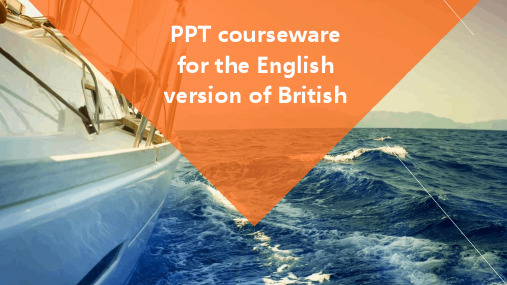
Middle Ages
Summary
The Development and Transformation of Medieval England
Detailed description
medieval England experienced a transformation from feudal society to capitalism, and made tremendous progress in economy, culture, and technology. At the same time, this period was also filled with wars and political turmoil, such as the Rose Wars and the Hundred Years War between England and France.
During the Industrial Revolution
Summary
The Impact of the Industrial Revolution on Britain
Detailed description
The Industrial Revolution from the late 18th to early 19th century completely changed the face of Britain, making it the world's first industrialized country. The Industrial Revolution brought about a great increase in productivity, but
- 1、下载文档前请自行甄别文档内容的完整性,平台不提供额外的编辑、内容补充、找答案等附加服务。
- 2、"仅部分预览"的文档,不可在线预览部分如存在完整性等问题,可反馈申请退款(可完整预览的文档不适用该条件!)。
- 3、如文档侵犯您的权益,请联系客服反馈,我们会尽快为您处理(人工客服工作时间:9:00-18:30)。
Chapter 2 Roman Britain
Roman Invasion (55BC-410AD)
British recorded history begins with Roman invasion.
– first landing in55 B.C. led by Julius Caesar
• The purpose of the BC / AD dating system
– to make the birth of Jesus Christ the dividing point
of world history
Gaius Julius Caesar
(July 13, 100 BC– March 15, 44 BC)
• Generally mild and temperate weather
– allows farming to flourish across the country – North: less fertile land, wetter – South: fertile land, drier
1.2 Early Settlers
– complete control over the land in 43 A.D. – leaving in around 410 A.D.
What is the meaning of B.C. and A.D.?
• BC – stands for "before Christ"
• AD – stands for the Latin phrase “anno domini” – means "in the year of our Lord"
1.1 Geography: Geography and History
• isolated from Europe by the English Channel and the North Sea
• once perceived as being on the edge of the world
BC—50
1.1 Geography: Some Terminology
Official title
– United Kingdom of Great Britain and Northern Ireland
– British Isles
• including Great Britain, the whole of Ireland, all the offshore islands
Stonehenge
In Search of History 00:20 — 01:38
1.2 Early Settlers
• The Celts (Iron Age, 700—100 BC)
– from north-western Europe, ancestors of the highland Scots, the Irish and Welsh
• Hunters and gatherers
– Old Stone Age (Paleolithic), 70,000—8000 BC – Middle Stone Age (Mesolithic), 8300—3500 BC – New Stone Age (Neolithic), 3500—2500 BC
1.2 Early Settlers
• New Stone Age , 3500—2500 BC
– Stonehenge 史前巨石阵
• a monumental circular setting of large standing stones surrounded by an earthwork
Chapter 1 Early England
1. Old Stone Age, 70,000—8000 BC 2. Middle Stone Age , 8300—3500 BC 3. New Stone Age , 3500—2500 BC 4. Bronze Age, 2500—700 BC (Iberians) 5. Iron Age, 700—100 BC (Celts) 6. The Dawning of English History 150
An Introduction to British History and Culture
English History
• Prehistoric England • Roman Britain (43-410) • The Anglo-Saxons and Vikings (450-1066) • Normans and Plantagenets (1066-1272) • Lancaster and York (1272-1485) • The Tudors (1485-1603) • The Stuarts (1603-1714) • Order and Disorder (1714-1837) • Victoria and Empire (1837-1910) • Peace and War (1910-1945) • Contemporary Britain (1945- )
• The seas around Britain also acted as barriers against attempted invasions:
– The Armada, 1588; the French, 1805, Nazi Germany, 1940
1.1 Geography: Weather
• a Roman military and political
leader
• played a critical role in the
transformation of the Roman Republic into the Roman Empire
Roman Invasion (55 BC - 410 AD)
